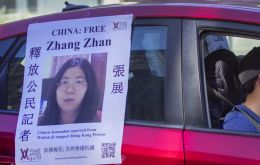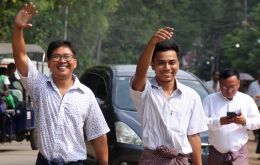MercoPress. South Atlantic News Agency
Tag: press freedom
-
Thursday, December 9th 2021 - 09:20 UTC
IAPA condemns journalist's arrest by Cuba's regime

The Inter-American Press Association (IAPA) Wednesday expressed its support for Cuban journalist Claudia Montero, who has been accused by the Government of President Miguel Díaz-Canel of causing “public disorder.”
-
Thursday, November 25th 2021 - 09:49 UTC
Peru's President not a stalwart of freedom of the press, Human Rights Watch claims

The Washington DC-based Human Rights Watch organization Wednesday said Peru's President Pedro Castillo Terrones undermined freedom of expression after the head of state threatened to withdraw all state advertising from media outlets.
-
Tuesday, May 25th 2021 - 08:44 UTC
EU hits back at Belarus for hijacking of Ryanair flight

The European Union seems determined not to let Sunday's incident at Minsk airport go by and is pressing for harsh sanctions against the regime of Belarussian leader Aleksander Lukashenko, starting with a ban on all Belarussian aircraft to fly through EU skies.
-
Tuesday, April 20th 2021 - 10:30 UTC
Uruguay leads freedom of press in South America; Brazil falls down to red zone in RSF ratings

With no South American country among the top 12, the Non-Government Organization Reporters Without Borders (RSF - the acronym for Reporters sans frontières) Monday lowered Brazil's freedom of the press rankings to 111th, thus placing it within the red zone.
-
Friday, February 12th 2021 - 08:39 UTC
BBC World News barred from China in retaliation for UK revoking Beijing's CGTN network

Chinese regulators have accused the UK's global broadcaster of breaking China's media code. The move follows the decision by UK authorities to revoke the license for China's global state TV network CGTN.
-
Tuesday, December 29th 2020 - 09:01 UTC
China censorship: four-year jail term for journalist who reported on the Covid-19 pandemic in Wuhan

A Chinese court handed a four-year jail term on Monday to a citizen-journalist who reported from the central city of Wuhan at the peak of last year's coronavirus outbreak, on grounds of “picking quarrels and provoking trouble,” her lawyer said.
-
Saturday, May 30th 2020 - 08:43 UTC
Brazilian reporters withdraw from presidential palace coverage because of attacks by Bolsonaro followers

Brazil's four largest news media outlets said they have withdrawn their reporters from coverage of President Jair Bolsonaro's official residence due to the lack of security to protect them from heckling and abuse by his supporters.
-
Monday, May 4th 2020 - 07:32 UTC
Press Freedom provides the antidote for the pandemic of misinformation

Journalists and media workers are crucial in helping us make informed decisions. As the world fights the COVID-19 pandemic, those decisions can make the difference between life and death.
-
Thursday, January 23rd 2020 - 08:37 UTC
Eclectic Bolsonaro declares he would no longer speak to journalists, following criticism from reporters union

A frequent and fiery critic of Brazil's media, President Jair Bolsonaro declared on Wednesday he would no longer speak to journalists. Bolsonaro made the remarks outside his official residence in Brasilia where most mornings for the past year he has fielded questions from reporters and greeted fans.
-
Tuesday, May 7th 2019 - 09:04 UTC
Myanmar releases two Reuters reporters imprisoned for 500 days

Two Reuters journalists jailed in Myanmar after they were convicted of breaking the Official Secrets Act walked free from a prison on the outskirts of Yangon on Tuesday after spending more than 500 days behind bars, witnesses said.
